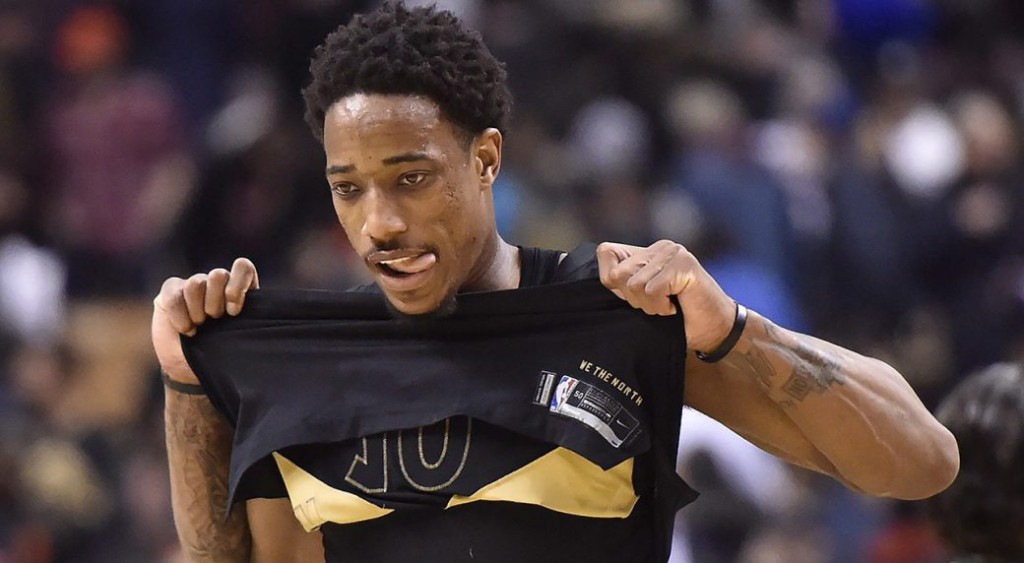What do Babe Ruth, Willie Mays, Johnny Unitas, Joe Montana, Jerry Rice, and Patrick Ewing all have in common? They were first ballot Hall of Famers who were kicked to the curb by their signature teams once they felt that they could do better without them. What I have never quite understood is why fans are so much more critical of the player who rejects loyalty while giving teams a pass for the same behavior?
While I do not contend either DeMar DeRozan or Kawhi Leonard are on the level of the players previously mentioned, I was reminded of such players this past week when the two were traded for one another. Especially noteworthy was DeRozen’s shock and dumbfounded reaction.
DeRozan seemed to feel that since he has indeed been among the 3-4 best shooting guards in the NBA over the past 10 years, it would account for something. He thought that because he had embraced the Toronto community and life, like no other Raptor before him, to include the significant additional tax burden, that he was above his current fate. DeRozan evidently thought that because management did not imply in any way that he was indeed expendable, which he wasn’t. He thought because he never considered leaving via free agency a few years ago that his demonstrated loyalty to the team would be reciprocated.
There is a phrase that best summarizes the only response to DeRozan’s disappointment:
“Wake up and smell the coffee.”
DeRozan made one fatal flaw that is not uncommon for loyalists; he thought that the loyalty he extended would have been reciprocated. He was wrong.
I am not making light of how he feels nor the impact of an involuntary move on an NBA player and his family…even a multimillionaire. It is no small or simple thing to have to uproot one’s family and literally move them to another country. The children must change schools, etc. I even agree with DeRozan that at the very least the “humane” thing for the Raptors to do would have been to alert him that they would consider moving him.
But professional sports is often not humane. It is the descendent of the gladiator world of ancient Rome, and when you cannot entertain the fans or provide the labor your team wants, you will be discarded as easily as a piece of meat for the hungry lions.
This callousness is by no means limited to sports. Look at the raid on public employee pension plans. Or the austerity approach to public debt while simultaneously giving tax breaks to the rich (of which admittedly DeRozan is a part of). Or dare I say, the reneging on contractually agreed upon raises for community college professors. Time and time again, those who ultimately control the capital have demonstrated that their use for those of us who are labor only extends to the degree that they can profit from our labor. There is nothing loyal or humane about this.
Now more than a few fans will dismiss DeRozan’s lament on the exclusive basis of “he makes a lot of money”. To those I refer you the late-great baseball all-star and free agency trailblazer Curt Flood. In 1969, AFTER his contract with the Cardinals had expired, they traded him to the Philadelphia Phillies. Up until this point, baseball and all other sports could do this under something referred to as the “Reserve Clause”, which essentially determined that a player’s rights, even if no longer under contract belong to a team until that team decided to either cut the player or trade him. The only problem was that Flood refused the trade under the notion that he was not a piece of chattel or property. When he alluded to chattel, that outraged many in that he seemed to be comparing himself to a slave. When asked by the iconic Howard Cosell about the appropriateness of the analogy given that he was paid a salary of over $100,000 at that time, Flood responded “a well-paid slave is a slave nonetheless”.
What happened to DeRozan is but more proof that there is neither loyalty in sports nor the larger American society. Furthermore, it is a prime example why I NEVER dispute a player’s attempt to get every dime he can from owners in the short run. In the long run, we must decide what kind of society we want, both inside and outside sports. Do we want one with no sense of reciprocal obligations to humanity? Or one that validates “dog eat dog” parasitic behavior under the notion of “it’s just business”?
Clearly DeRozan was under the wrong impression which of these two societies he currently resides.
Gus Griffin, for War Room Sports
Tags: All's Fair in Sports and War, DeMar DeRozan, Gus Griffin, Kawhi Leonard, Loyalty, NBA, San Antonio Spurs, Sports, Toronto Raptors, Trade, War Room Sports, WRS

